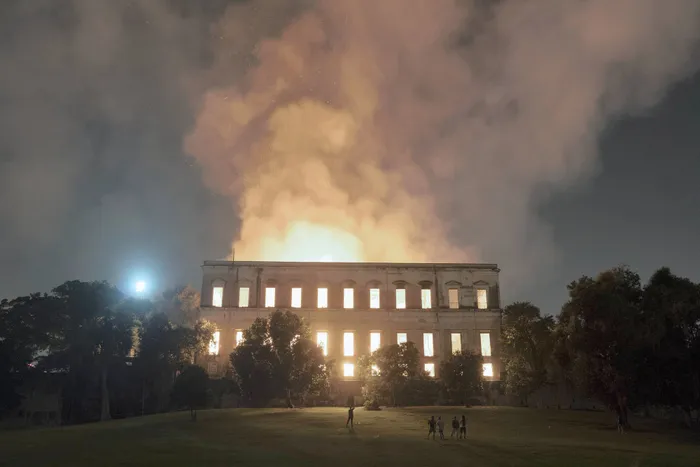Anger smoulders in Brazil after much-loved museum burns down

The 200-year-old National Museum of Brazil, in Rio de Janeiro, which caught ablaze on Sunday. Picture: Reuters The 200-year-old National Museum of Brazil, in Rio de Janeiro, which caught ablaze on Sunday. Picture: Reuters
Rio de Janeiro - Anger smoldered in Brazil
on Monday after a fire destroyed the National Museum, a
cherished historical repository that lacked a sprinkler system
and which had suffered years of financial neglect, making its
destruction a "tragedy foretold."
Outside the entrance to the elegant park housing the
200-year-old former Imperial Palace, police in riot gear shot
tear gas into a small, angry crowd that tried to enter, live TV
images showed. Later, police granted access to the site's
perimeter, which protesters surrounded in a symbolic "embrace."
The rumbling tensions reflect anger over the destruction on
Sunday of the much-loved yet dilapidated museum, which suffered
from declining federal funding. It stirred emotions in Brazil,
whose angry electorate is reeling from a frail economy,
widespread graft and rising violence ahead of an unpredictable
presidential election in October.
"Our community is very mobilized, and very indignant," said
Roberto Leher, rector of the Rio de Janeiro federal university,
which administers the museum. "We all knew the building was
vulnerable."
Brazil's culture minister Sergio Leitao told the Estado de
S.Paulo newspaper the blaze was likely caused by either an
electrical short-circuit or a homemade paper hot-air balloon
that may have landed on the roof. Launching such balloons is a
long-held tradition in Brazil and they routinely cause fires.
Both possibilities were being considered, Culture Ministry
spokeswoman Roberta de Oliveira Ribeiro said in an email, but
the cause would not be known until an investigation was
completed. The Rio de Janeiro federal university did not
immediately respond to a question on whether the museum was
insured.
The museum's pastel-yellow facade remained standing after
the blaze, but a peek inside its giant windows revealed a
roofless interior of blackened hallways and charred beams. Every
so often, firemen emerged with a pot or a painting they had
managed to rescue.

An aerial view of the National Museum of Brazil after a fire burnt it in Rio de Janeiro. REUTERS/Ricardo Moraes
The museum's vice director, Luiz Duarte, told Globo TV the
institution had been neglected by successive federal
governments. He said a 21.6 million-real ($5.23 million)
financing plan with the state-run development bank BNDES
announced in June included, ironically, a plan to install modern
fire protection equipment.
The Rio fire department's commander, Roberto Robadey, said
the hydrants outside the building were dry when firefighters
arrived, forcing them to turn to a nearby lake and tanker trucks
for water.
"Yesterday was one of the saddest days of my career," he
said.
The museum is not the first to burn down in Brazil, where
public money for cultural projects has been drying up after a
deep recession. In 2015, for example, a blaze destroyed the
prestigious Museum of the Portuguese Language in Sao Paulo.
In 2016, President Michel Temer was forced to reinstate the
Culture Ministry after an outcry from some of the country's top
artists over his policy to fold it into the Education Ministry
to save money.
On Monday, his office said he had met with representatives
from major Brazilian companies and banks to look into ways to
help rebuild the museum "as soon as possible."
Education Minister Rossieli Soares told reporters outside
the burned-out building on Monday that the federal government
would spend an initial 15 million reais, in two separate
installments, to restore the structure and rebuild its
collection. He added that Brazil would seek international help,
and was already in discussions with UNESCO.
The museum's decline did not happen overnight, said Renato
Rodriguez Cabral, a teacher in the geology and paleontology
department.
"This was a tragedy foretold," Cabral said, hugging
distraught students and coworkers who poured into the site on
Monday. "Successive governments would not provide funds, they
would not invest in infrastructure."
Between 2013 and 2017, the National Museum in Rio's federal
funding fell about a third, to 643,567 reais, according to
official budget data. The funding cuts were particularly acute
this year, with the museum receiving just 98,115 reais between
January and August.
Late last year,, after a termite attack shuttered a room
hosting the bones of the Maxakalisaurus dinosaur, the National
Museum was forced to turn to a crowdfunding site to seek funds
for reopening the exhibit.
It raised nearly 60,000 reais, almost double its goal.
The National Museum's collection ranged from archeological
finds to historical memorabilia.
The museum, which is tied to the Rio de Janeiro federal
university and the education ministry, was founded in 1818 and
housed several landmark collections, including Egyptian
artifacts and the oldest human fossil found in Brazil.
The destruction of the building, where emperors once lived,
was an "incalculable loss for Brazil," Temer said in a
statement.
His office did not respond to requests for comment on
widespread allegations of neglect.
Reuters
* This story forms part of the #HighSchoolsQuiz study material. Click here for more #HighSchoolsQuiz stories.